Diploma in Early Childhood Education: Non-Compliant Practice Report
VerifiedAdded on 2022/08/16
|7
|1160
|11
Report
AI Summary
This report examines non-compliant practices within an early childhood education setting, specifically addressing a scenario involving staff absences, unqualified personnel, and expired certifications. It identifies several non-compliant behaviors, including a lack of communication regarding staff absences and the use of uncertified supervisors and staff with expired first-aid certificates. The report then delves into the legal and ethical frameworks relevant to the situation, highlighting the right to make informed decisions and meet social needs. It also outlines the risks associated with non-compliance, such as equal employment opportunity breaches and confidentiality violations. Furthermore, the report proposes a staff absence policy, detailing its distribution, monitoring, and enforcement to ensure compliance and mitigate risks. The importance of staff training and the renewal of certifications are also emphasized to establish a safe and legally sound environment.
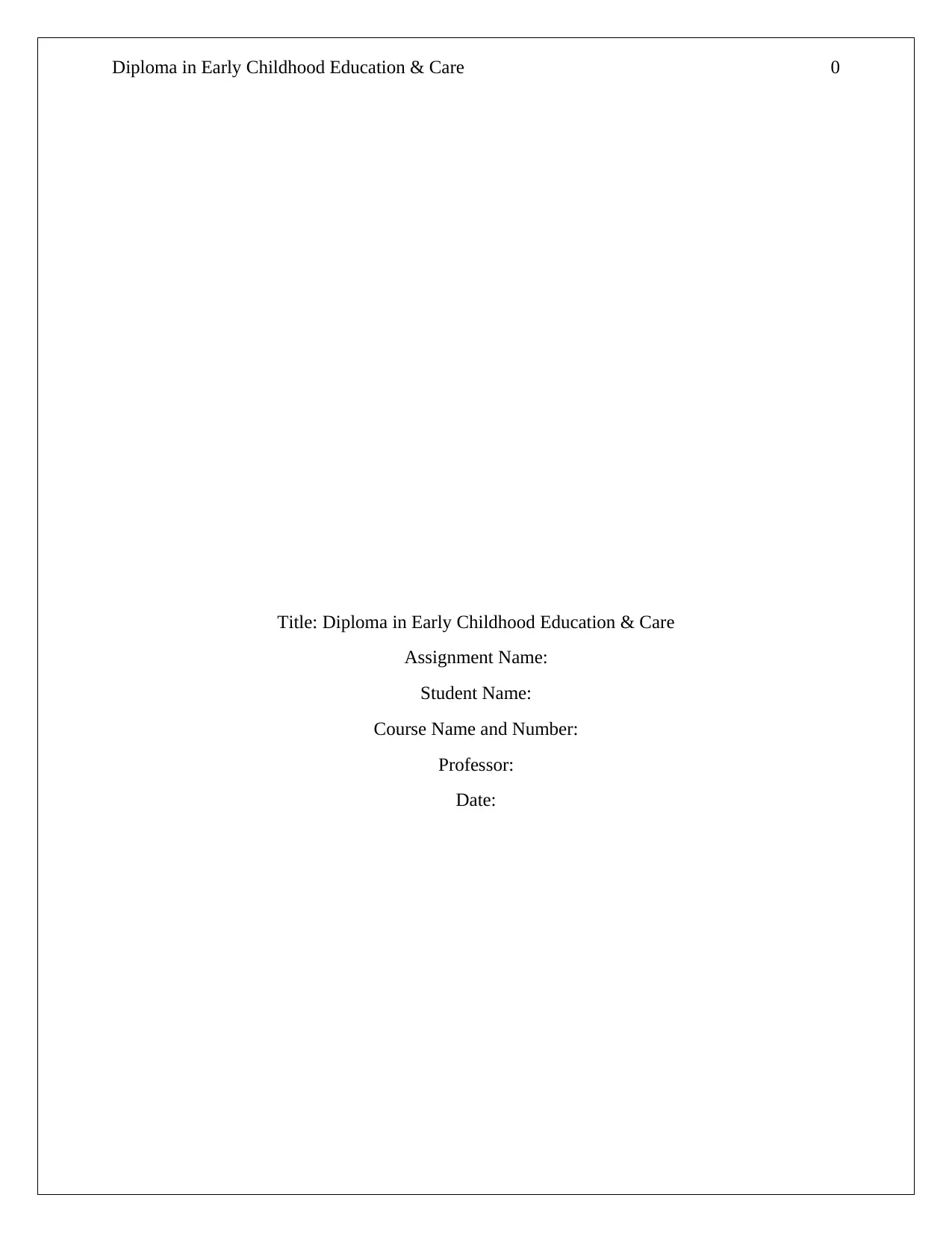
Diploma in Early Childhood Education & Care 0
Title: Diploma in Early Childhood Education & Care
Assignment Name:
Student Name:
Course Name and Number:
Professor:
Date:
Title: Diploma in Early Childhood Education & Care
Assignment Name:
Student Name:
Course Name and Number:
Professor:
Date:
Paraphrase This Document
Need a fresh take? Get an instant paraphrase of this document with our AI Paraphraser
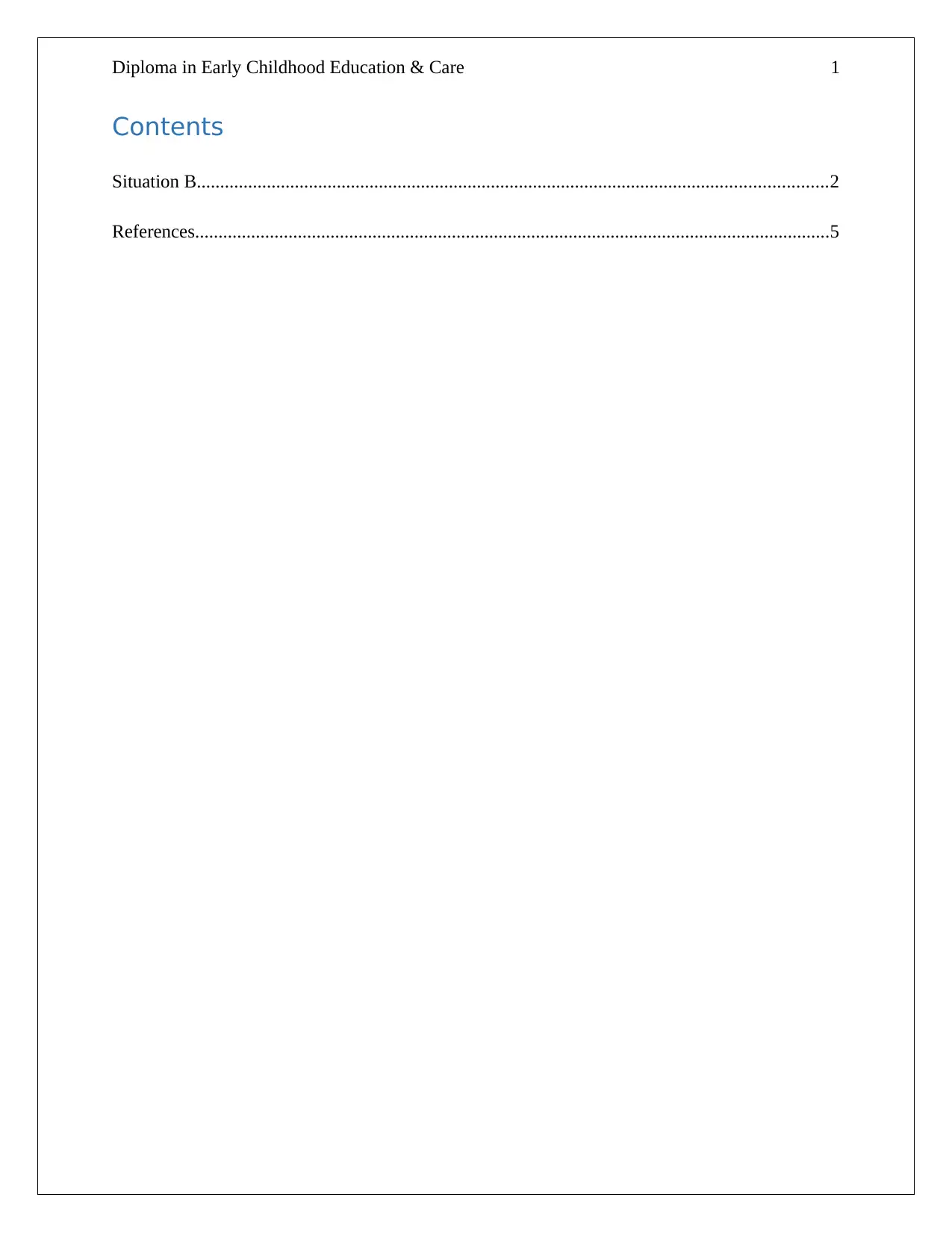
Diploma in Early Childhood Education & Care 1
Contents
Situation B.......................................................................................................................................2
References........................................................................................................................................5
Contents
Situation B.......................................................................................................................................2
References........................................................................................................................................5
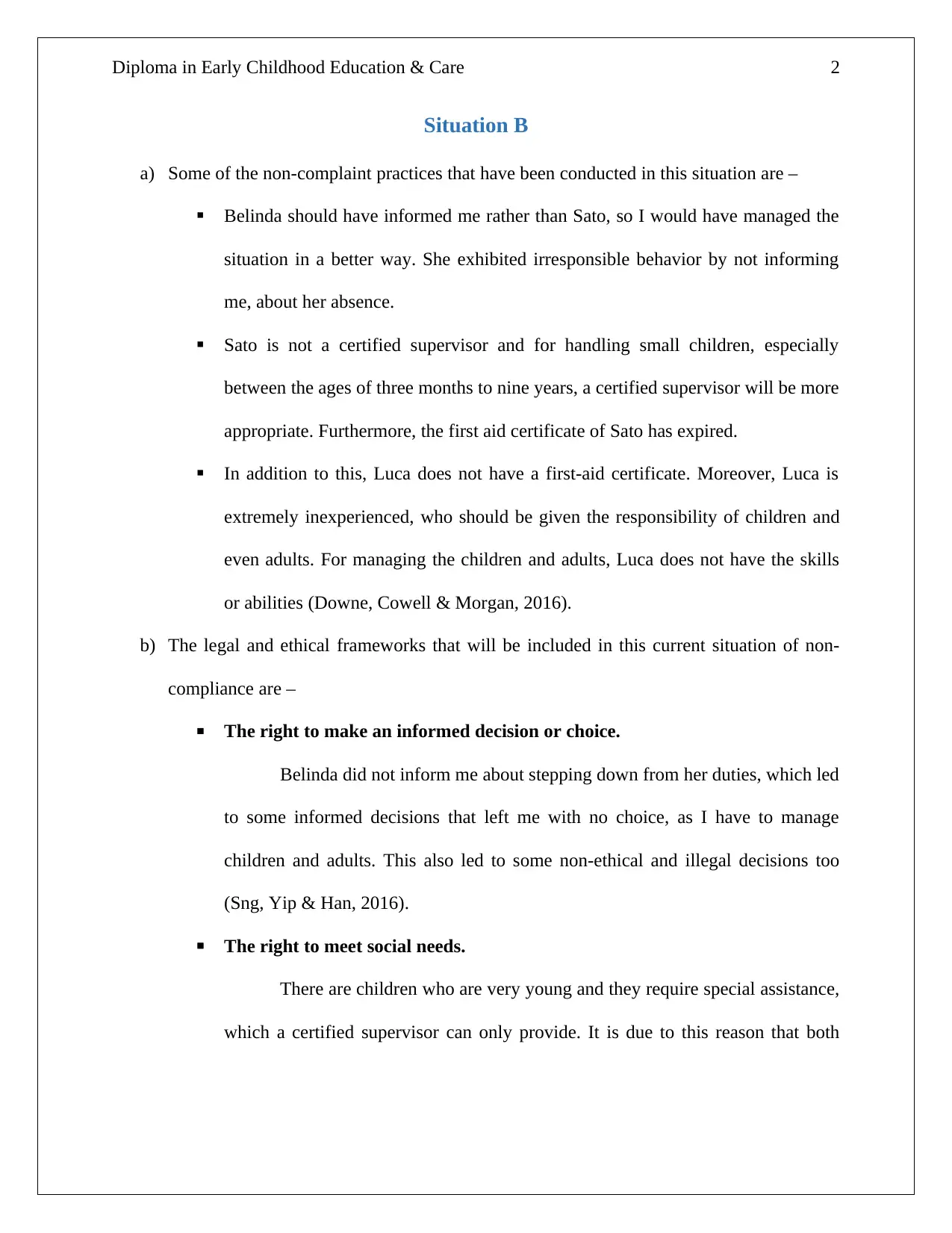
Diploma in Early Childhood Education & Care 2
Situation B
a) Some of the non-complaint practices that have been conducted in this situation are –
Belinda should have informed me rather than Sato, so I would have managed the
situation in a better way. She exhibited irresponsible behavior by not informing
me, about her absence.
Sato is not a certified supervisor and for handling small children, especially
between the ages of three months to nine years, a certified supervisor will be more
appropriate. Furthermore, the first aid certificate of Sato has expired.
In addition to this, Luca does not have a first-aid certificate. Moreover, Luca is
extremely inexperienced, who should be given the responsibility of children and
even adults. For managing the children and adults, Luca does not have the skills
or abilities (Downe, Cowell & Morgan, 2016).
b) The legal and ethical frameworks that will be included in this current situation of non-
compliance are –
The right to make an informed decision or choice.
Belinda did not inform me about stepping down from her duties, which led
to some informed decisions that left me with no choice, as I have to manage
children and adults. This also led to some non-ethical and illegal decisions too
(Sng, Yip & Han, 2016).
The right to meet social needs.
There are children who are very young and they require special assistance,
which a certified supervisor can only provide. It is due to this reason that both
Situation B
a) Some of the non-complaint practices that have been conducted in this situation are –
Belinda should have informed me rather than Sato, so I would have managed the
situation in a better way. She exhibited irresponsible behavior by not informing
me, about her absence.
Sato is not a certified supervisor and for handling small children, especially
between the ages of three months to nine years, a certified supervisor will be more
appropriate. Furthermore, the first aid certificate of Sato has expired.
In addition to this, Luca does not have a first-aid certificate. Moreover, Luca is
extremely inexperienced, who should be given the responsibility of children and
even adults. For managing the children and adults, Luca does not have the skills
or abilities (Downe, Cowell & Morgan, 2016).
b) The legal and ethical frameworks that will be included in this current situation of non-
compliance are –
The right to make an informed decision or choice.
Belinda did not inform me about stepping down from her duties, which led
to some informed decisions that left me with no choice, as I have to manage
children and adults. This also led to some non-ethical and illegal decisions too
(Sng, Yip & Han, 2016).
The right to meet social needs.
There are children who are very young and they require special assistance,
which a certified supervisor can only provide. It is due to this reason that both
⊘ This is a preview!⊘
Do you want full access?
Subscribe today to unlock all pages.

Trusted by 1+ million students worldwide
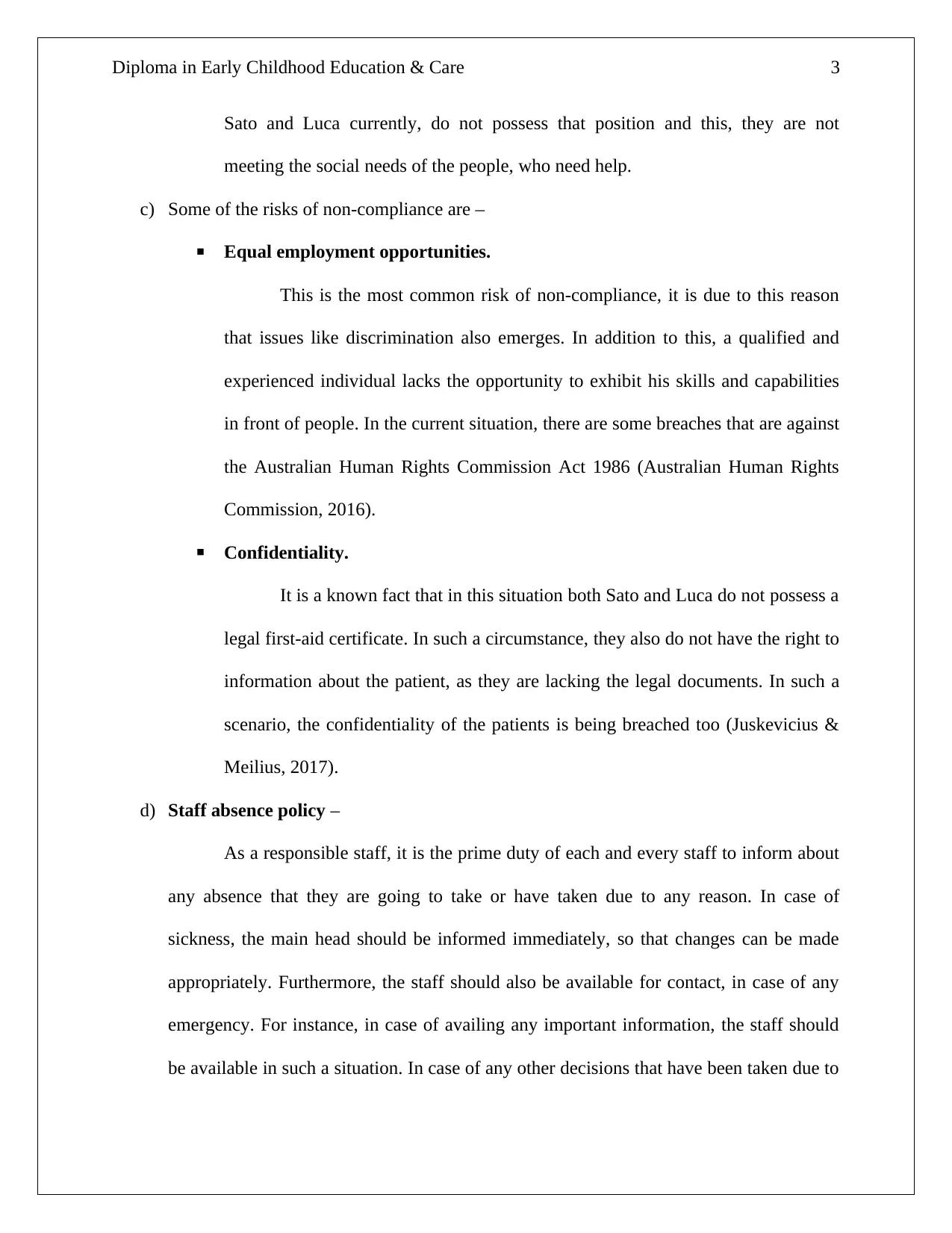
Diploma in Early Childhood Education & Care 3
Sato and Luca currently, do not possess that position and this, they are not
meeting the social needs of the people, who need help.
c) Some of the risks of non-compliance are –
Equal employment opportunities.
This is the most common risk of non-compliance, it is due to this reason
that issues like discrimination also emerges. In addition to this, a qualified and
experienced individual lacks the opportunity to exhibit his skills and capabilities
in front of people. In the current situation, there are some breaches that are against
the Australian Human Rights Commission Act 1986 (Australian Human Rights
Commission, 2016).
Confidentiality.
It is a known fact that in this situation both Sato and Luca do not possess a
legal first-aid certificate. In such a circumstance, they also do not have the right to
information about the patient, as they are lacking the legal documents. In such a
scenario, the confidentiality of the patients is being breached too (Juskevicius &
Meilius, 2017).
d) Staff absence policy –
As a responsible staff, it is the prime duty of each and every staff to inform about
any absence that they are going to take or have taken due to any reason. In case of
sickness, the main head should be informed immediately, so that changes can be made
appropriately. Furthermore, the staff should also be available for contact, in case of any
emergency. For instance, in case of availing any important information, the staff should
be available in such a situation. In case of any other decisions that have been taken due to
Sato and Luca currently, do not possess that position and this, they are not
meeting the social needs of the people, who need help.
c) Some of the risks of non-compliance are –
Equal employment opportunities.
This is the most common risk of non-compliance, it is due to this reason
that issues like discrimination also emerges. In addition to this, a qualified and
experienced individual lacks the opportunity to exhibit his skills and capabilities
in front of people. In the current situation, there are some breaches that are against
the Australian Human Rights Commission Act 1986 (Australian Human Rights
Commission, 2016).
Confidentiality.
It is a known fact that in this situation both Sato and Luca do not possess a
legal first-aid certificate. In such a circumstance, they also do not have the right to
information about the patient, as they are lacking the legal documents. In such a
scenario, the confidentiality of the patients is being breached too (Juskevicius &
Meilius, 2017).
d) Staff absence policy –
As a responsible staff, it is the prime duty of each and every staff to inform about
any absence that they are going to take or have taken due to any reason. In case of
sickness, the main head should be informed immediately, so that changes can be made
appropriately. Furthermore, the staff should also be available for contact, in case of any
emergency. For instance, in case of availing any important information, the staff should
be available in such a situation. In case of any other decisions that have been taken due to
Paraphrase This Document
Need a fresh take? Get an instant paraphrase of this document with our AI Paraphraser
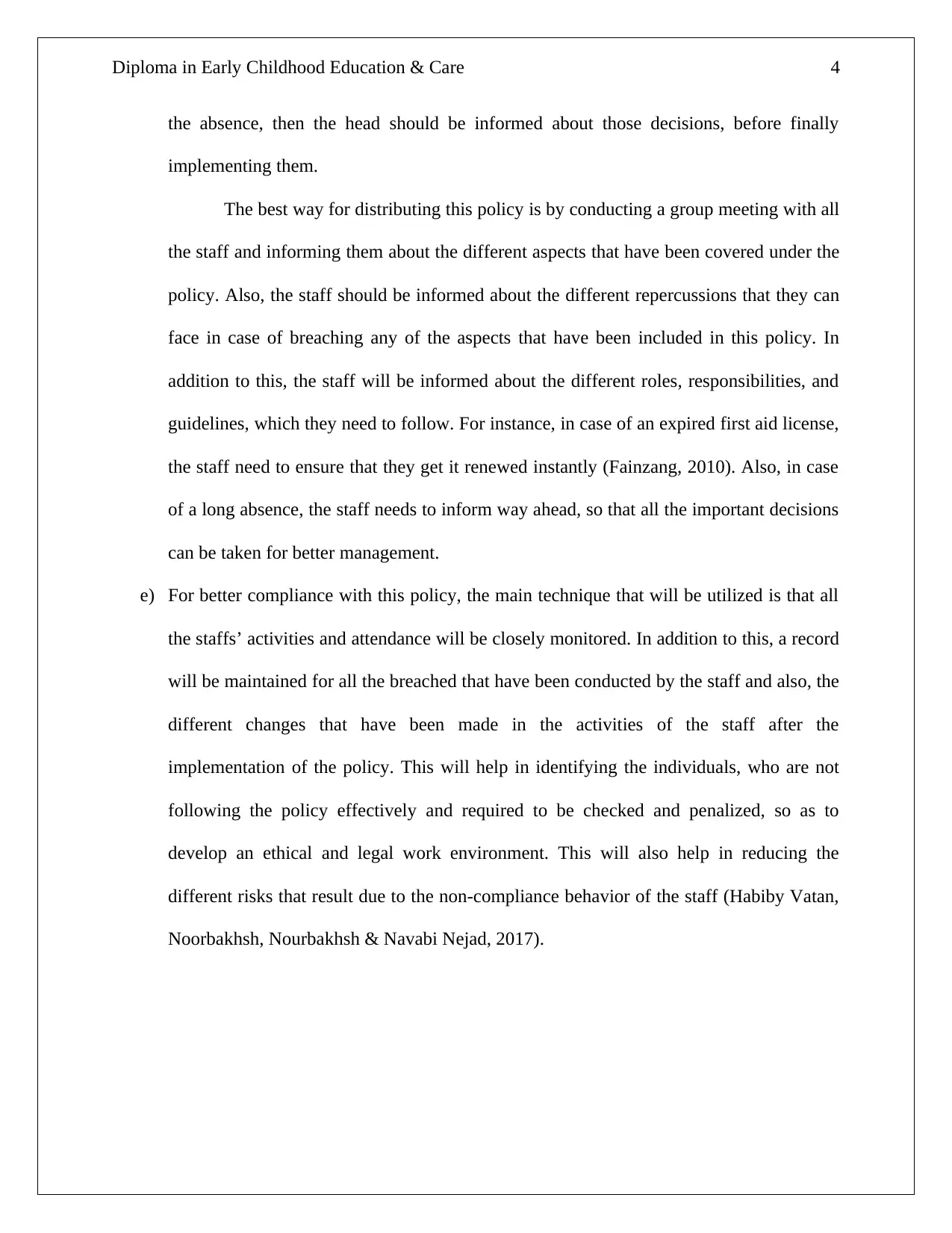
Diploma in Early Childhood Education & Care 4
the absence, then the head should be informed about those decisions, before finally
implementing them.
The best way for distributing this policy is by conducting a group meeting with all
the staff and informing them about the different aspects that have been covered under the
policy. Also, the staff should be informed about the different repercussions that they can
face in case of breaching any of the aspects that have been included in this policy. In
addition to this, the staff will be informed about the different roles, responsibilities, and
guidelines, which they need to follow. For instance, in case of an expired first aid license,
the staff need to ensure that they get it renewed instantly (Fainzang, 2010). Also, in case
of a long absence, the staff needs to inform way ahead, so that all the important decisions
can be taken for better management.
e) For better compliance with this policy, the main technique that will be utilized is that all
the staffs’ activities and attendance will be closely monitored. In addition to this, a record
will be maintained for all the breached that have been conducted by the staff and also, the
different changes that have been made in the activities of the staff after the
implementation of the policy. This will help in identifying the individuals, who are not
following the policy effectively and required to be checked and penalized, so as to
develop an ethical and legal work environment. This will also help in reducing the
different risks that result due to the non-compliance behavior of the staff (Habiby Vatan,
Noorbakhsh, Nourbakhsh & Navabi Nejad, 2017).
the absence, then the head should be informed about those decisions, before finally
implementing them.
The best way for distributing this policy is by conducting a group meeting with all
the staff and informing them about the different aspects that have been covered under the
policy. Also, the staff should be informed about the different repercussions that they can
face in case of breaching any of the aspects that have been included in this policy. In
addition to this, the staff will be informed about the different roles, responsibilities, and
guidelines, which they need to follow. For instance, in case of an expired first aid license,
the staff need to ensure that they get it renewed instantly (Fainzang, 2010). Also, in case
of a long absence, the staff needs to inform way ahead, so that all the important decisions
can be taken for better management.
e) For better compliance with this policy, the main technique that will be utilized is that all
the staffs’ activities and attendance will be closely monitored. In addition to this, a record
will be maintained for all the breached that have been conducted by the staff and also, the
different changes that have been made in the activities of the staff after the
implementation of the policy. This will help in identifying the individuals, who are not
following the policy effectively and required to be checked and penalized, so as to
develop an ethical and legal work environment. This will also help in reducing the
different risks that result due to the non-compliance behavior of the staff (Habiby Vatan,
Noorbakhsh, Nourbakhsh & Navabi Nejad, 2017).
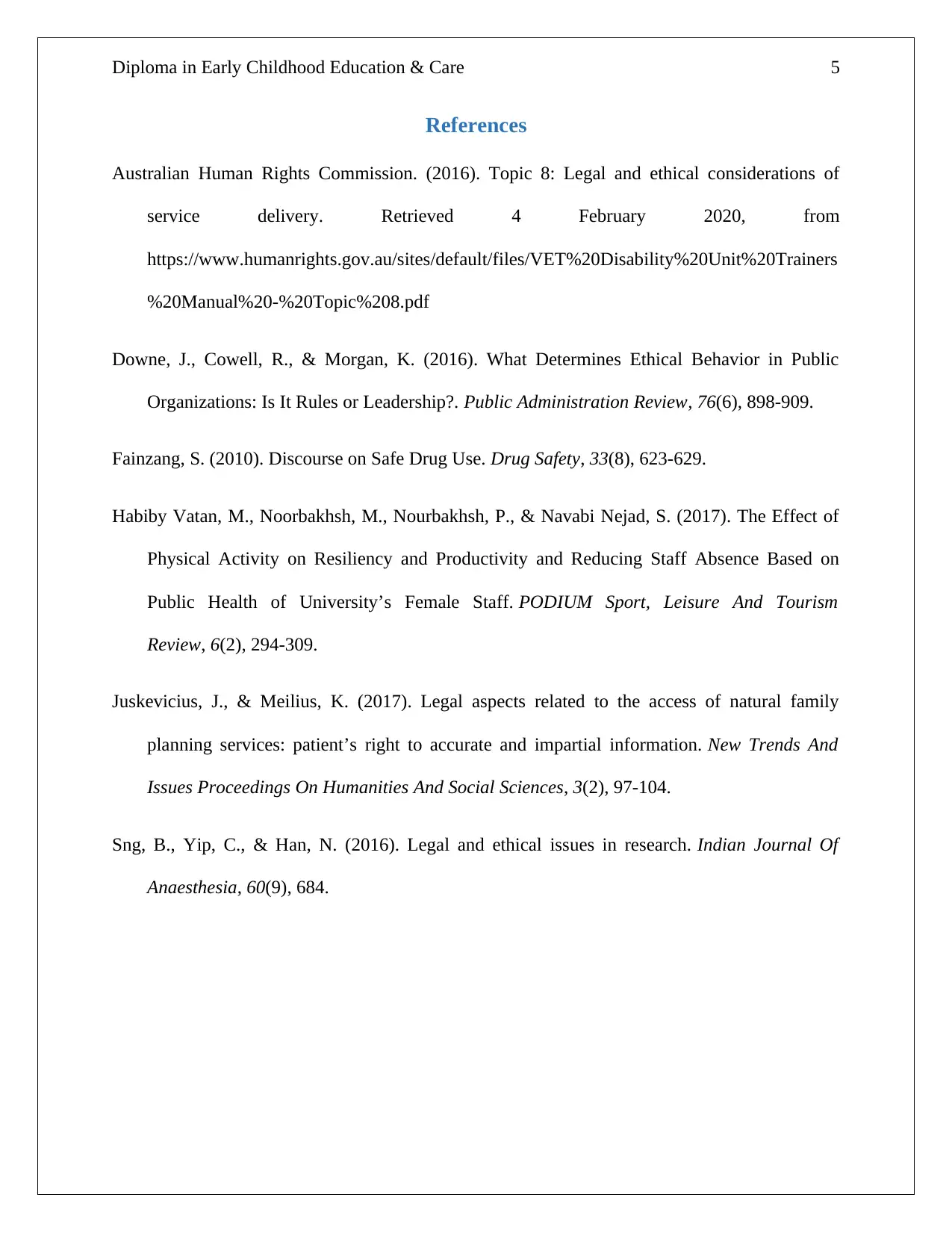
Diploma in Early Childhood Education & Care 5
References
Australian Human Rights Commission. (2016). Topic 8: Legal and ethical considerations of
service delivery. Retrieved 4 February 2020, from
https://www.humanrights.gov.au/sites/default/files/VET%20Disability%20Unit%20Trainers
%20Manual%20-%20Topic%208.pdf
Downe, J., Cowell, R., & Morgan, K. (2016). What Determines Ethical Behavior in Public
Organizations: Is It Rules or Leadership?. Public Administration Review, 76(6), 898-909.
Fainzang, S. (2010). Discourse on Safe Drug Use. Drug Safety, 33(8), 623-629.
Habiby Vatan, M., Noorbakhsh, M., Nourbakhsh, P., & Navabi Nejad, S. (2017). The Effect of
Physical Activity on Resiliency and Productivity and Reducing Staff Absence Based on
Public Health of University’s Female Staff. PODIUM Sport, Leisure And Tourism
Review, 6(2), 294-309.
Juskevicius, J., & Meilius, K. (2017). Legal aspects related to the access of natural family
planning services: patient’s right to accurate and impartial information. New Trends And
Issues Proceedings On Humanities And Social Sciences, 3(2), 97-104.
Sng, B., Yip, C., & Han, N. (2016). Legal and ethical issues in research. Indian Journal Of
Anaesthesia, 60(9), 684.
References
Australian Human Rights Commission. (2016). Topic 8: Legal and ethical considerations of
service delivery. Retrieved 4 February 2020, from
https://www.humanrights.gov.au/sites/default/files/VET%20Disability%20Unit%20Trainers
%20Manual%20-%20Topic%208.pdf
Downe, J., Cowell, R., & Morgan, K. (2016). What Determines Ethical Behavior in Public
Organizations: Is It Rules or Leadership?. Public Administration Review, 76(6), 898-909.
Fainzang, S. (2010). Discourse on Safe Drug Use. Drug Safety, 33(8), 623-629.
Habiby Vatan, M., Noorbakhsh, M., Nourbakhsh, P., & Navabi Nejad, S. (2017). The Effect of
Physical Activity on Resiliency and Productivity and Reducing Staff Absence Based on
Public Health of University’s Female Staff. PODIUM Sport, Leisure And Tourism
Review, 6(2), 294-309.
Juskevicius, J., & Meilius, K. (2017). Legal aspects related to the access of natural family
planning services: patient’s right to accurate and impartial information. New Trends And
Issues Proceedings On Humanities And Social Sciences, 3(2), 97-104.
Sng, B., Yip, C., & Han, N. (2016). Legal and ethical issues in research. Indian Journal Of
Anaesthesia, 60(9), 684.
⊘ This is a preview!⊘
Do you want full access?
Subscribe today to unlock all pages.

Trusted by 1+ million students worldwide
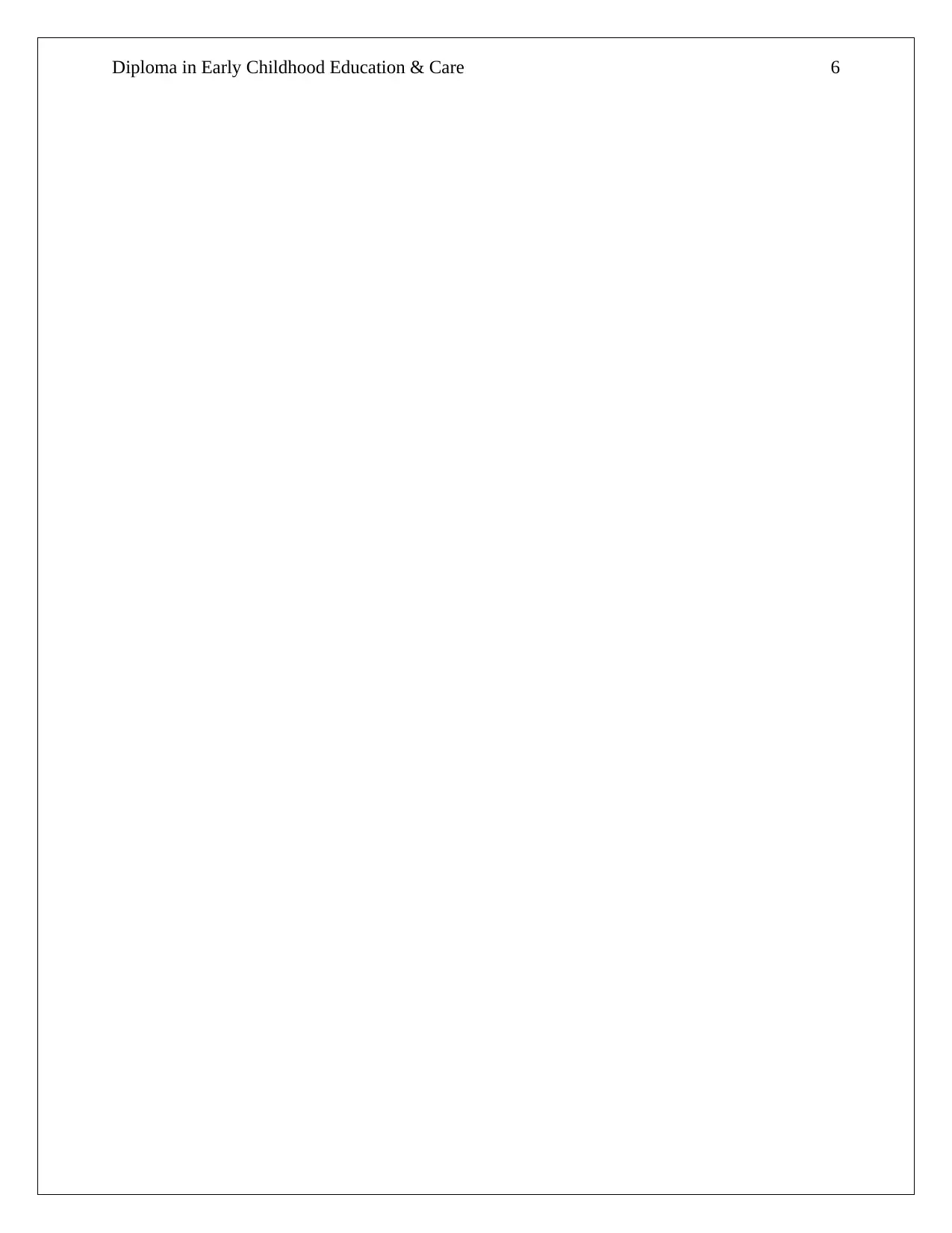
Diploma in Early Childhood Education & Care 6
1 out of 7
Your All-in-One AI-Powered Toolkit for Academic Success.
+13062052269
info@desklib.com
Available 24*7 on WhatsApp / Email
![[object Object]](/_next/static/media/star-bottom.7253800d.svg)
Unlock your academic potential
Copyright © 2020–2025 A2Z Services. All Rights Reserved. Developed and managed by ZUCOL.